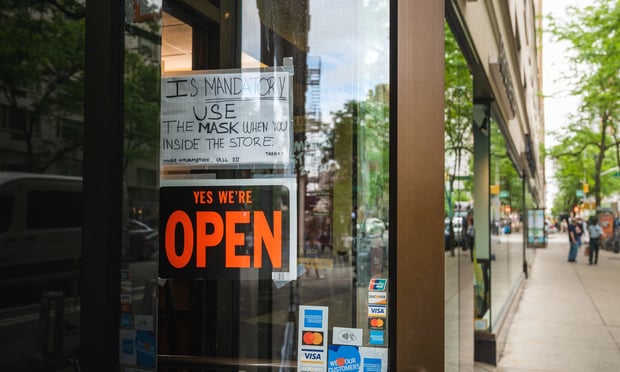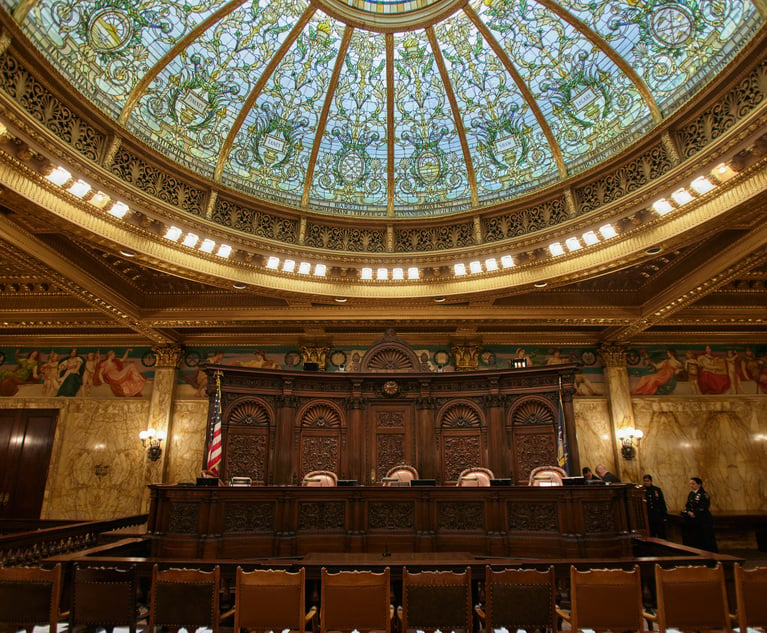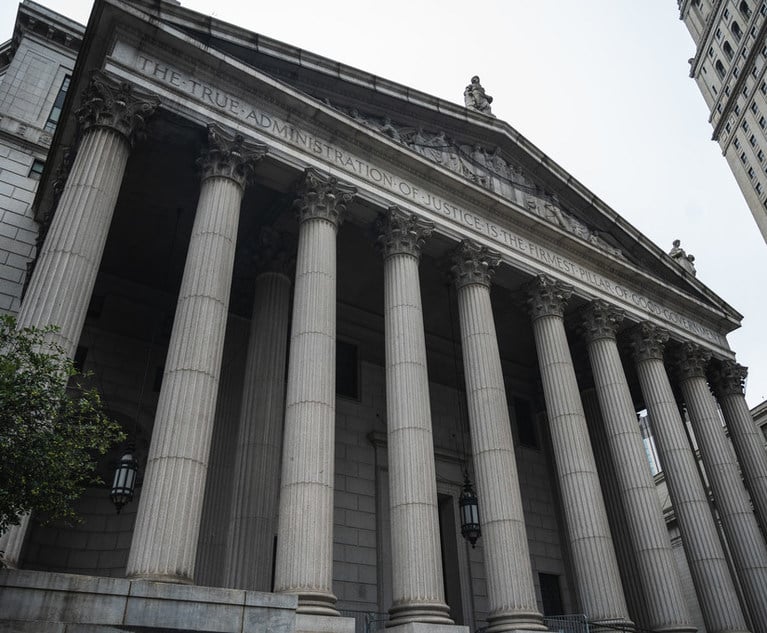COVID-19's Effect on the Dynamic Workplace Safety-Employee Privacy Relationship
Over the past several weeks, some local governments around the globe have begun slowly to initiate progressive measures to revise and even rescind COVID-19 emergency legislation, orders and lockdowns.
June 30, 2020 at 04:55 PM
7 minute read
 A coffee shop in Manhatan posts a sign on their door saying it is mandatory to wear a mask in the store. Photo: Ryland West/ ALM
A coffee shop in Manhatan posts a sign on their door saying it is mandatory to wear a mask in the store. Photo: Ryland West/ ALM
Over the past several weeks, some local governments around the globe have begun slowly to initiate progressive measures to revise and even rescind COVID-19 emergency legislation, orders and lockdowns. These governments now are grappling with workplace-specific issues. As such, employers must determine how to maintain their duty of care to all employees and to protect employees' health and safety, while safeguarding employees' privacy.
This inevitable and inherent tension underlies the discussion surrounding several workplace issues, including COVID-19 testing, taking temperatures, requiring face coverings and disclosing COVID-19 exposure in employee return to work questionnaires. The below analysis highlights some general themes and practices before providing some country-specific information. Note, however, that this is intended as a high-level overview of the applicable legal issues in certain jurisdictions, and this country-specific information likely is not sufficiently comprehensive or exhaustive to address fact-intensive inquiries and concerns.
COVID-19 Testing
Assuming that COVID-19 tests are available and can produce accurate results quickly, certain countries, including Australia and Brazil, allow employers to require employees to submit to COVID-19 tests. In such countries, the principle of protecting employees' health is paramount in relation to employee privacy concerns. Employers, however, may be required to support such a request with a lawful and reasonable purpose. For example, employers must comply with privacy laws when requiring COVID-19 testing of employees and failure to do so may render such requests unlawful. In addition, prior to requiring a COVID-19 test, employees may have to show or report COVID-19 symptoms. Many countries also require employers to obtain employee consent in a certain form prior to mandating COVID-19 testing. For example, in Luxembourg, Thailand and the United Kingdom, employee consent should be obtained in writing. That said, some countries, including France and Germany, among others, do not allow employers to require COVID-19 testing of employees because, for example, nasal swabs are invasive and employers unlikely are able to justify that such a test is necessary and proportionate, except in very exceptional cases, employers are not allowed to require employees to submit to any type of health check and employers cannot process any medical data of employees. Some other countries, including the Netherlands and Singapore, do not allow employers to require COVID-19 testing, and instead only company doctors or medical professionals may assess whether employees should take a COVID-19 test.
Temperature Screening
Across international jurisdictions, assuming that thermometers are adequately cleaned and sanitized, employers overwhelmingly are allowed to require employees to have their temperature screened prior to entering the workplace. Temperature screenings generally are considered the least drastic measure to maintain employees' health and safety at the workplace. Several countries, including China, Colombia, Indonesia and Malaysia, among others, legally require employers to screen employees' temperatures as part of a standard health measure. Other countries, including Japan, also allow employers to screen employees' temperatures, but as a best practice, employee consent should be obtained in advance. Furthermore, in Belgium, prior to screening employees' temperatures, employers should consider obtaining the advice of the company doctor and health and safety committee.
Despite the international community's broad support for allowing employers to screen employees' temperatures, some countries, including Luxembourg and the Netherlands, do not allow employers to screen employees' temperatures prior to entering the workplace because medical data, including temperature, is employees' medical data that cannot be processed. In addition, while France does not ban temperature screening, it is not recommended. Instead, the French government recommends that all employees measure their temperature if they believe that they may have a fever and self-monitor the appearance of symptoms suggestive of COVID-19. Even in jurisdictions where temperature screening is not permitted, it always is possible to request employees to monitor their own temperatures.
Face Coverings
Generally, employers likely may require employees to wear face coverings in the workplace during the COVID-19 pandemic to protect all employees' health and safety. This is true even in countries that are highly protective of employees' privacy rights, including France and Germany. Indeed, many countries, including Chile, China, Italy and Singapore, among others, require employees to wear face coverings in the workplace. Employers should consider who will provide the face coverings, and if employees must provide their own face coverings, who will cover the costs of the face covering.
Disclosing COVID-19 Exposure in Return to Work Questionnaires
Prior to returning to the workplace, employees in many jurisdictions, including, for example, Brazil, Germany and Singapore, may be required to certify responses to questionnaires that inquire about COVID-19 diagnosis, symptoms and close contacts with individuals who are or have been diagnosed with COVID-19. Requiring employees to certify certain COVID-19 information places a premium on workplace safety because collecting such information allows employers and local authorities to carry out COVID-19 response measures (e.g., contact tracing). If employees answer "Yes" or refuse to answer any such question, local law in China, Hong Kong, Japan and New Zealand, among other jurisdictions, allows employers to prevent such employees from entering the workplace.
But in other jurisdictions, employee privacy rights are paramount, even in the context of workplace safety. Note that employers always must comply with data protection laws when implementing protocols such as return to work questionnaires. In Singapore, for example, employers must comply with the Personal Data Protection Act and ensure that reasonable security arrangements are in place for the protection of collected information, collected information will not be used for purposes not related to COVID-19 response measures without employee consent or legal authorization and (iii) collected information will no longer be retained as soon as it is reasonable to assume that the COVID-19 response measures cease to exist. Indeed, in Ireland, employers also may be obliged to demonstrate a strong justification for requiring employees to certify such information based upon necessity and proportionality. In addition, in some countries, including the Netherlands, employers cannot process any medical data of employees. Rather, only a company doctor or other medical professional may ask these questions. Other jurisdictions, including France, completely ban employers from inquiring about COVID-19 exposure in such return to work questionnaires.
These are just some of the concerns that employers must consider. Stemming from these complicated issues, employers must determine (i) how to respond to inevitable violations of policies and requirements (e.g., whether to follow a progressive disciplinary procedure or to terminate the employment relationship) and (ii) how to maintain the confidentiality of employee medical information while still notifying the applicable government authorities and employees who have had close contact with employees who have been diagnosed with COVID-19 or are suspected COVID-19 cases.
Generally, it is crucial that employers communicate effectively with employees when managing the COVID-19 return to the workplace phase. To alleviate employees' fears when returning to the workplace, employers should provide employees with a COVID-19 Safety Policy/COVID-19 Return to Work Policy that sets out the precautionary and preventative measures and controls that employers are implementing to ensure all employees' health and safety. Such a policy should identify and implement employers' measures to mitigate the risk of infection (e.g., social distancing measures, wearing face coverings and maintaining high standards of hygiene and cleanliness).
In the end, COVID-19 legislation, emergency orders and lockdowns are dynamic, fluid and changing rapidly. As a best practice, employers should seek legal counsel for timely analysis and guidance on any COVID-19-related issue. Obtaining legal counsel also will allow employers to appreciate the cultural differences and nuances that permeate the multi-national employer-employee relationship generally and affect employers' strategies and responses to the current COVID-19 pandemic.
Erika C. Collins is a member of Epstein Becker Green's employment, labor and workforce management practice. Based in New York, she co-heads the firm's international employment law group.
Ryan H. Hutzler is an associate in the employment, labor and workforce management practice, in the Washington, D.C,., office of the firm.
This content has been archived. It is available through our partners, LexisNexis® and Bloomberg Law.
To view this content, please continue to their sites.
Not a Lexis Subscriber?
Subscribe Now
Not a Bloomberg Law Subscriber?
Subscribe Now
NOT FOR REPRINT
© 2025 ALM Global, LLC, All Rights Reserved. Request academic re-use from www.copyright.com. All other uses, submit a request to [email protected]. For more information visit Asset & Logo Licensing.
You Might Like
View All
Decision of the Day: Trial Court's Sidestep of 'Batson' Deprived Defendant of Challenge to Jury Discrimination

Decision of the Day: Commercial Division Finds Defendant Engaged in Unfair Competition Against Plaintiff

Decision of the Day: Court Rules on Judgment Motions Over Police Killing of Pet Dog While Executing Warrant

Decision of the Day: JFK to Paris Stowaway's Bail Revocation Explained
Law Firms Mentioned
Trending Stories
- 1'Lookback Window' Law for Child Abuse Cases Constitutional, State High Court Finds
- 2Troutman Pepper Says Ex-Associate Who Alleged Racial Discrimination Lost Job Because of Failure to Improve
- 3Texas Bankruptcy Judge Withdraws Ethics Complaint Against Jackson Walker
- 4Apply Now: Superior Court Judge Sought for Mountain Judicial Circuit Bench
- 5Harrisburg Jury Hands Up $1.5M Verdict to Teen Struck by Underinsured Driver
Who Got The Work
J. Brugh Lower of Gibbons has entered an appearance for industrial equipment supplier Devco Corporation in a pending trademark infringement lawsuit. The suit, accusing the defendant of selling knock-off Graco products, was filed Dec. 18 in New Jersey District Court by Rivkin Radler on behalf of Graco Inc. and Graco Minnesota. The case, assigned to U.S. District Judge Zahid N. Quraishi, is 3:24-cv-11294, Graco Inc. et al v. Devco Corporation.
Who Got The Work
Rebecca Maller-Stein and Kent A. Yalowitz of Arnold & Porter Kaye Scholer have entered their appearances for Hanaco Venture Capital and its executives, Lior Prosor and David Frankel, in a pending securities lawsuit. The action, filed on Dec. 24 in New York Southern District Court by Zell, Aron & Co. on behalf of Goldeneye Advisors, accuses the defendants of negligently and fraudulently managing the plaintiff's $1 million investment. The case, assigned to U.S. District Judge Vernon S. Broderick, is 1:24-cv-09918, Goldeneye Advisors, LLC v. Hanaco Venture Capital, Ltd. et al.
Who Got The Work
Attorneys from A&O Shearman has stepped in as defense counsel for Toronto-Dominion Bank and other defendants in a pending securities class action. The suit, filed Dec. 11 in New York Southern District Court by Bleichmar Fonti & Auld, accuses the defendants of concealing the bank's 'pervasive' deficiencies in regards to its compliance with the Bank Secrecy Act and the quality of its anti-money laundering controls. The case, assigned to U.S. District Judge Arun Subramanian, is 1:24-cv-09445, Gonzalez v. The Toronto-Dominion Bank et al.
Who Got The Work
Crown Castle International, a Pennsylvania company providing shared communications infrastructure, has turned to Luke D. Wolf of Gordon Rees Scully Mansukhani to fend off a pending breach-of-contract lawsuit. The court action, filed Nov. 25 in Michigan Eastern District Court by Hooper Hathaway PC on behalf of The Town Residences LLC, accuses Crown Castle of failing to transfer approximately $30,000 in utility payments from T-Mobile in breach of a roof-top lease and assignment agreement. The case, assigned to U.S. District Judge Susan K. Declercq, is 2:24-cv-13131, The Town Residences LLC v. T-Mobile US, Inc. et al.
Who Got The Work
Wilfred P. Coronato and Daniel M. Schwartz of McCarter & English have stepped in as defense counsel to Electrolux Home Products Inc. in a pending product liability lawsuit. The court action, filed Nov. 26 in New York Eastern District Court by Poulos Lopiccolo PC and Nagel Rice LLP on behalf of David Stern, alleges that the defendant's refrigerators’ drawers and shelving repeatedly break and fall apart within months after purchase. The case, assigned to U.S. District Judge Joan M. Azrack, is 2:24-cv-08204, Stern v. Electrolux Home Products, Inc.
Featured Firms
Law Offices of Gary Martin Hays & Associates, P.C.
(470) 294-1674
Law Offices of Mark E. Salomone
(857) 444-6468
Smith & Hassler
(713) 739-1250






